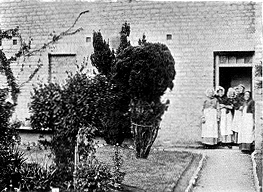|
|
A Month in an English Poorhouse,
Page 8 of 9  A Group of the Inmates
no one loves. One curate, a young man with a strong, earnest face, seemed to realize this, and, leaning over the little reading desk, he would forget to preach, in his desire to speak such words as he could of comfort and encouragement.
The chapel, which cost about £1000, was built wholly by charitable contributions, the work being superintended by the vicar of the parish. The day it was formally opened was a great day for the Union, as the bishop of the diocese and other great people were to be present. Naturally all of the inmates were out in full force, new suits and dresses making them look a highly respectable congregation. One little incident impressed me, as showing an unusual amount of thoughtfulness in the treatment of these people. As there had been a considerable debt incurred in the building of the chapel, and as most of the gentry from the surrounding parishes would be present at the services, it was decided that this would be a favorable time for taking up a collection. It occurred to one person, however, that when this was done there would be one large part of the congregation, the inmates of the Union, who, since they had nothing, would have nothing to give. Fortunately, in this case a well filled purse was behind a warm heart, and from it came a generous supply of silver, divided equally among the inmates, so that, when the box was passed, each dropped in a sixpence with as much pride as their titled neighbors did a sovereign. The social magnates of the county look upon the building of a workhouse chapel like this as one of the legitimate charities which they are bound to support, and they take a thoroughly practical interest in it. One of the principal offices of the parish Union is the sheltering of the floating vagrant population. By the present poor law of the kingdom, those who may make application at the Union, declaring that they are without the means of procuring food and shelter, are fed and lodged for at least one night, being required to do a stated amount of work the next day in return. In the case of men, this means cutting wood or breaking stone for a certain number of hours, while the women pick oakum. The number of persons who make such application is considerable. I do not think that there was ever a night, during the month that I was at the Union, that the “tramp house,” as it was called, was empty, while sometimes there would be as many as a dozen seeking shelter. Among these there would occasionally be an intelligent, self-respecting person, whom misfortune of some kind, illness or lack of work, had reduced to this strait; but usually the applicants belonged to the true vagrant class, whose life is practically spent in tramping from one end of Great Britain to the other, claiming |
|
8
Books & articles appearing here are modified adaptations
from a private collection of vintage books & magazines. Reproduction of these pages is prohibited without written permission. © Laurel O'Donnell, 1996-2006.
|
|

